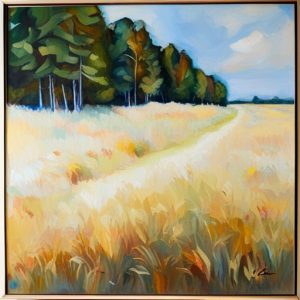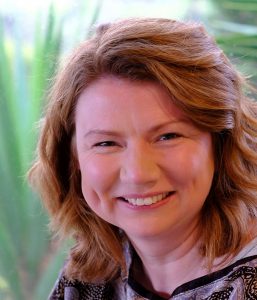
By Olga Hogan.
‘Don’t walk backwards!’ she tells me. We’re coming home from the lake. It is late spring and the lilac trees lining the path are in full bloom. The air vibrates with sweet perfume, making me believe in magical places. I am six years old, acting out a story for my grandmother, and I am at the best part when an eagle emerges from a magic pebble to fight the king of the serpents. Grandma is scowling, she is bothered. That bothers me.
‘Stop walking backwards!’ she says.
‘Why?’ I ask, still walking backwards.
‘Your parents will die.’
I stop in my tracks. On the way home, I kick the loose stones on the path, worried about the number of backward steps I might have taken so far and if it’s been enough to cause damage to my parents’ lives. This question horrifies me. I can’t remember the number of steps, but I remember how many days I have done it. For the rest of the summer, I worry about my mother and my father and if I’ll ever see them again. I also worry about the strange powers my grandmother holds to know such things.
Years later, I am living in Australia. My father has come from Estonia for the summer. We have gone for a walk on the beach, and my six-year-old son is skipping backwards on the hot sand. I am immediately taken by a familiar panic and tell him to stop. My father looks at me.
‘Did you ever walk backwards on the stony path coming home from the lake?,’ he asks.
‘Yes …’
‘And …?’
I don’t answer.
‘And? What happened?’ he repeats.
I bend to pick up a pretty pebble. ‘Grandma told me that you would die if I kept doing it.’
‘Ah! I thought she might have said that! My grandmother told me exactly the same thing.’
‘She did?’
‘Yes. It’s a family tradition.’
‘And … were you worried about your parents?’
‘Nah. Never believed any of these old stories.’
‘Even when you were a kid?’
He smiles. ‘No, never!’
I believe him. He’s an analytical type, although I have seen him spit over his shoulder when a black cat crosses the road.
‘You know, being a grandparent is scarier than being a parent,’ my dad continues.
I am surprised. My dad is not known for sharing his feelings. ‘You see, as a parent, if something happens to your child, that’s an infinite heartache. But if something were to happen to your grandchild,’ he pauses, ‘it’s an infinite heartache for your child and for you.’ A longer pause follows, ‘It’s like dying twice.’
*
There were two versions of my grandparents: one for each of the solstice months. My winter grandparents lived in an inner-city apartment at the foot of medieval Tallinn. I visited them every cold and freezing weekend and they smothered me with love. I loved walking with my grandparents through the streets of the old town. My favourite time of the day was in the late afternoon, just before the streetlights softly reduce the evening darkness. The smell of the woodstoves in the crispy cold air breathed pungent life into the stories my grandpa was telling me. The day’s ending turned magical. My grandpa had met every ghost in Old Tallinn, and he knew all the stories about the trees and the rocks that belonged to the Border People—the people of Seto from the borderland between Estonia and Russia.
‘How are your parents?’ he asks me.
I look at my boots. The streetlights are making the snow sparkle under them.
‘You know back home we have these old oaks with a gap in the middle that is large enough to fit two people. The old wise trees have been on this land for so many years and they have seen so many things that they can help people figure out what is important and what is not. So, you see when two quarrelling friends step inside the hollow of the tree and spend a few hours there, the tree will help them find the way to be friends again.’
I am not sure that the tree can teach my dad to do the dishes but I make a mental note to find this tree when I am there in the summer. I know that it will take me some time to adjust to the summer version of my grandparents.
The five-hour drive from Tallinn to the land of Seto turned my grandparents into very different people. Come spring, this beautiful land and the new house they were building became their favourite grandchildren, and I was barely on their mind. This was the third house our family was re-building on this land. The first had been lost to a fire during World War 2 and the second, re-built on a nearby spot by great-grandfather, had been lost to a fire started by his cigarette. My summer grandparents swapped storytelling for short matter-of-fact sentences. Grandpa pointed out the barely visible ruins of the old houses and grandma pointed to the rosehip bushes that the women of my family had planted each time a new house was re-built.
I was now mostly left to my own devices. I invented my own magical world, woven from the snippets of adult conversations I overheard at the family gatherings that punctuated the summer weeks.
In the mornings, I helped my grandparents in the fields, where they grew strawberries and potatoes. I would not be allowed near the strawberries until I was much older. Their delicate flowers and offshoots were far too precious. My domain was indestructible spuds. In spring I was taught how to use a ‘special’ twig to plant each potato an equal distance from the next. Later I was shown how to weed the rows of small offshoots and I learned not to confuse the weeds and future potato leaves. Several weeks of nurturing resulted in beautiful even rows of deep green bushes standing tall like fairy-tale defence walls to get lost daydreaming.
After each morning in the fields I went home for lunch.
After lunch, my grandmother opened the door onto the yard and the wilderness beyond. ‘Come home before the night sets in,’ she would say. ‘Don’t go to the border!’ she would warn.
And so, every afternoon, I roamed freely in the borderland land of Seto with the other kids who, like me, had been shipped off to their grandparents for the summer. It was not hard to fill our afternoon with heroic adventures. We attacked invisible giants by rolling down the hill, built castles from the lake’s clay, pretended to be dragons by sticking river leeches on each other. We rowed leaky boats to the middle of the lake. We piled empty spray cans on kindling, lit a fire, and watched the explosion, hoping for magical creatures to appear out of the blaze. At dusk, we came home, invincible warriors, for the most part physically intact. We took for granted that our grandparents were blissfully unaware of the joys we had experienced and the dangers we had barely escaped.
The border had once been the state line between independent Estonia and the Soviet Union. After World War 2, the Soviets annexed Estonia and the land of Seto, and the line was removed. By the late 80s, the border was just an unusually large gap between two settlements.
The landscape once scarred with war trenches was now covered in luscious grass, and this was the place where the sweetest wild strawberries grew. With no trees to steal the sunlight, these wild strawberries were so sweet and aromatic that we could feel the taste in our mouths just by laying on the grass next to them. The best way to enjoy those wild strawberries was to gather a fist full of them, gobble them up in one go and wait for the aromatic explosion in the mouth.
And this was the land that should remain off limits for fear of various natural and awful consequences. No one ever told me why.
Perhaps because the strawberries were irresistible or because we heard conflicting stories, we found creative means around the injunctions. Piggybacking over the border surely did not count as walking on the border.
At midsummer’s late morning we went to meet the extended family at the local cemetery. Sitting in the shade of tall trees near the grave of my great-grandfather, stuffing myself with freshly pickled cucumbers and listening to the grownups sharing their news and stories of their loved ones no longer with us, my ears pricked as I heard an old lady mention ‘the Border’. She was a cousin of my grandfather.
‘What about the border?’ I asked her.
She answered me at some length in the local dialect. I understood only two words, ‘lost’ and ‘daughter’.
The two words struck me with terror. ‘What have we done! We should never have ventured there. We should never have eaten the berries. What will happen to us now!’
I felt sick.
On the way back to my grandparents’ house, I turned pale and became so unwell that my grandmother stopped me and asked what was wrong. Tears came pouring out and between strained breaths I confessed to our escapades at ‘the Border’.
I still remember my head on my grandmother’s soft belly and her arms around me as she told me in her warm winter voice that a land can have scars and so can people’s memories.
‘Many families lost their loved ones when the border was there and during the war. And it does not matter how many years ago it was, the land and the memories will always be with us.’
In 1992, the Soviet Union collapsed, and Estonia became an independent country for the second time it its long history. But the old borders were not honoured and the land my grandparents loved so much was annexed by Russia. My grandparents moved permanently to Tallinn and faded away shortly afterwards. I lost them both before I was mature enough to say how much I loved both versions of them.

About the author:
Olga was born in Estonia. She moved to England at 23 where she did her PhD in chemistry, qualified as a chartered accountant, and met her Australian husband. This story was written to connect their Geelong-born son to Estonia.

Ilze Broders
A beautiful story Olga. I thoroughly enjoyed it. I am a Latvian Australian, living in Melbourne. Your story resonates with memories of my early childhood in Germany after my mother escaped from Latvia in early 1945. I was an only child, as my father, having been seconded to the German army, was serving as a young doctor in Berlin, where he was killed just before the war ended. I never did get to meet my grandparents who died before I managed to make my first trip to Latvia in 1987.
Thank you for your lovely story. Keep writing. I have always wanted to, but apart from a book that I wrote as a child, I have not tried again. Unfortunately, when I left home, my parents cleared all my school books and with them went the “novel” that I had written.
lelde muehlenbachs
Paldies from a Latvian neighbour
Bodil Rasmussen
Lovely human story with memories so beautifully portrayed, Olga
Reading your story reminded me of my Dad and me walking in the wood near our village in Denmark while he recovered from a heart attack at the age of 48 years. The doctor told him to walk every morning so we walked together. We talked about everything and I just remember the closeness I felt to my Dad. Your story triggered this memory and more, so yes, keep writing.